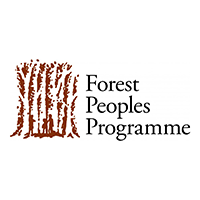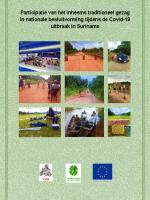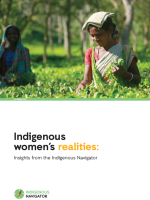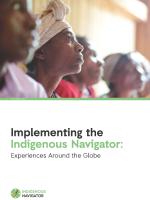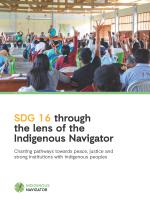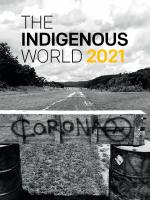Participatie van het Inheems traditioneel gezag in nationale besluitvorming tijdens de Covid-19 uitbraak in Suriname
Report is available in Dutch, produced by VIDS in Suriname. *English summary provided*
The Coronavirus disease (Covid-19) is an infectious disease caused by a coronavirus. The first Covid-19 case in Suriname was confirmed on March 13, 2020. Since then, a series of successive measures have been taken, including closing borders and schools, introducing curfews and distance learning, introducing lockdowns, quarantining communities and implementing a number of restrictive measures for daily activities. Several Indigenous communities have also been affected by Covid-19, with a worrying trend in the number of Indigenous people dying from the disease. While there has been some government involvement with the communities, there is no clear protocol or policy to involve Indigenous people in resolving the many problems posed by this pandemic. The Association of Indigenous Village Leaders in Suriname (VIDS) has therefore hired a consultant to conduct an independent evaluation of the involvement of the traditional authority by the Suriname government at the time of, and in response to, the Covid-19 outbreak in Suriname. The evaluation covers (1) identifying the measures taken by national and regional government agencies in response to the outbreak, (2) identifying the impact that the above measures have/ will have on the communities, (3) identifying what the administrative consequences are at village level, (4) writing an evaluation report (the current report) including a set of recommendations and (5) making a summary in English (incorporated in the current report). A desk study and interviews with key persons served as the basis for the evaluation.
Based on the desk study, it appears that the measures taken so far (from the first COVID-19 case on March 13 to December 31, 2020) include: closing national borders, closing schools, distance learning, lockdowns, curfews, restricting outpatient visits, limiting access to high-risk areas, taking measures at a personal level, (temporarily) closing hotels, casinos, churches and sports centers, opening restaurants in an appropriate way, limiting local flights, temporarily banning public transport; restrictions on gathering and restrictions on visits to the elderly. In addition, specific measures have been taken aimed at Indigenous communities, including: providing two satellite telephones to MZS to improve communication with the village of Sipaliwini Savanna, sending food packages to Sipaliwini Savanna, providing training by MZS on hygiene measures and awareness, identification of quarantine facilities, collaboration between the Surinamese Red Cross (SRK), MZS and VIDS for information exchange, support and production of information material, provision of information in various villages in Marowijne and temperature control of persons entering Galibi.
On April 16, 2020, there were consultations between the traditional authority of Indigenous and Tribal peoples and the President of Suriname, in which the traditional authority was asked to support the measures instituted by the government. After this meeting there was a zoom meeting between NCMT, MZS and the VIDS on June 17, during which the VIDS could make the points of concern known to the NCMT. VIDS has also tried to establish cooperation with NCMT by means of several letters and two consultation moments, which unfortunately did not yield much.
The authorities of individual Indigenous communities have themselves taken a number of measures. In addition, as a collective, the VIDS has taken general measures aimed at Indigenous communities, including setting up a communication network, translation of educational material into the Indigenous languages, extra attention for Covid-19 in their newsletter Maraka and development of an information brochure. Communities themselves have also taken measures including closing access roads, rivers and airports to villages, raising awareness of villagers, closing resorts under their control, and limiting the movement of villagers outside their own living area.
According to VIDS, the measures taken by the government have less beneficial effects on communities. Information was not always in intelligible languages or did not reach the communities optimally, tensions between armed forces and villagers, disruption of the lives of people living on national borders due to the prohibition of river crossing, shortages of food and adapted teaching methods that were not tailored to the conditions in the villages. Some of the aforementioned consequences also have an effect at the level of government, including the aforementioned tensions with armed forces, lack of understanding of the government for measures in hit by villages and disproportionate consequences for villagers because of measures that disrupt their lives.
A number of conclusions can be drawn on the basis of the desk study and interviews. Little help and information came to the villages from the government, and in some cases there was no contact at all from the government. Much of the information and assistance reached the communities through NGOs and medical specialists who did so from their duty as doctors. There was little consultation with traditional authorities about decisions to be made, leaving Indigenous communities on their own. The point of improving communication between the government and the traditional authority was emphasized by all parties involved.
Communities are recommended to increase their food production capacity, identify key individuals in support of the traditional authority in crisis management, establish a safety net for those affected, stay in touch with government agencies, move from education to in-depth conversations, highlight members of the community who are setting a good example and coordinating with care providers about the coordination of activities.
NGOs are recommended to avoid entering Indigenous habitats unless strictly necessary and security protocols followed by competent personnel, applying FPIC, reviewing or reconsidering ongoing projects, considering establishing reconstruction facilities and programs to support recovery of the population communities, making educational materials available in indigenous languages and disseminating with the help of young people in the communities who are handy with social media and before offering help, coordinate with the government and indigenous traditional authorities what help is still needed and desired.
The government is recommended to address pre-existing health deficiencies in the communities, to pay extra attention to existing health problems in those communities, to provide support to strengthen their food supply capacity, to maintain demographic data of Indigenous peoples as part of the statistics of the pandemic, show respect for and legal recognition of the right to self-determination, apply FPIC, take culturally sensitive measures taking into account the environment of the Indigenous people, prepare reconstruction funds and public facilities in support of recovery, ensure equal access to education for the children, providing education in the Indigenous languages, in a culturally sensitive manner and through effective means, making efforts to improve telecommunications infrastructure, recognizing the Indigenous traditional authority as legitimate representatives of the community and involve them in decision-making and implementation of crisis management and the planning of periodic evaluation moments with the various parties (aid workers and communities).
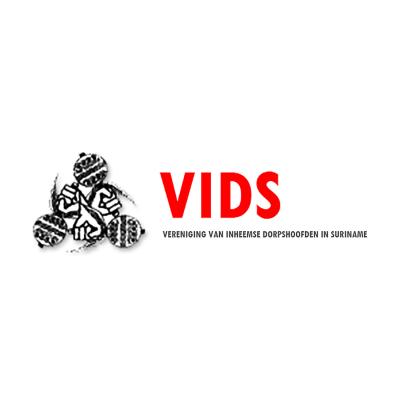
Vereniging Van Inheemse Dorpshoofden In Suriname (VIDS)
